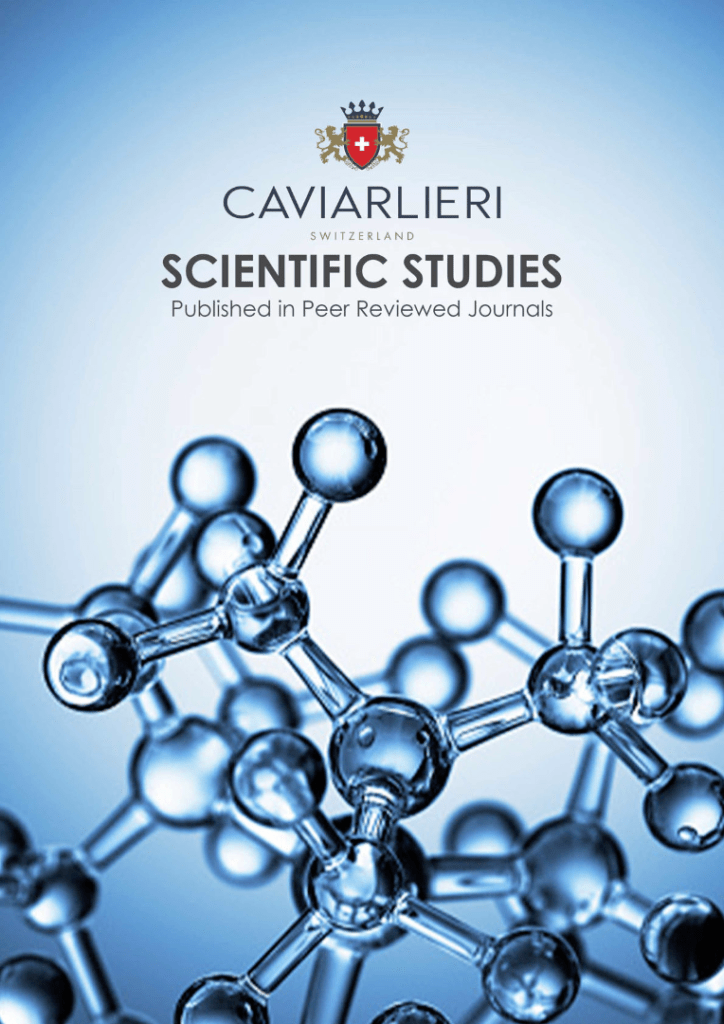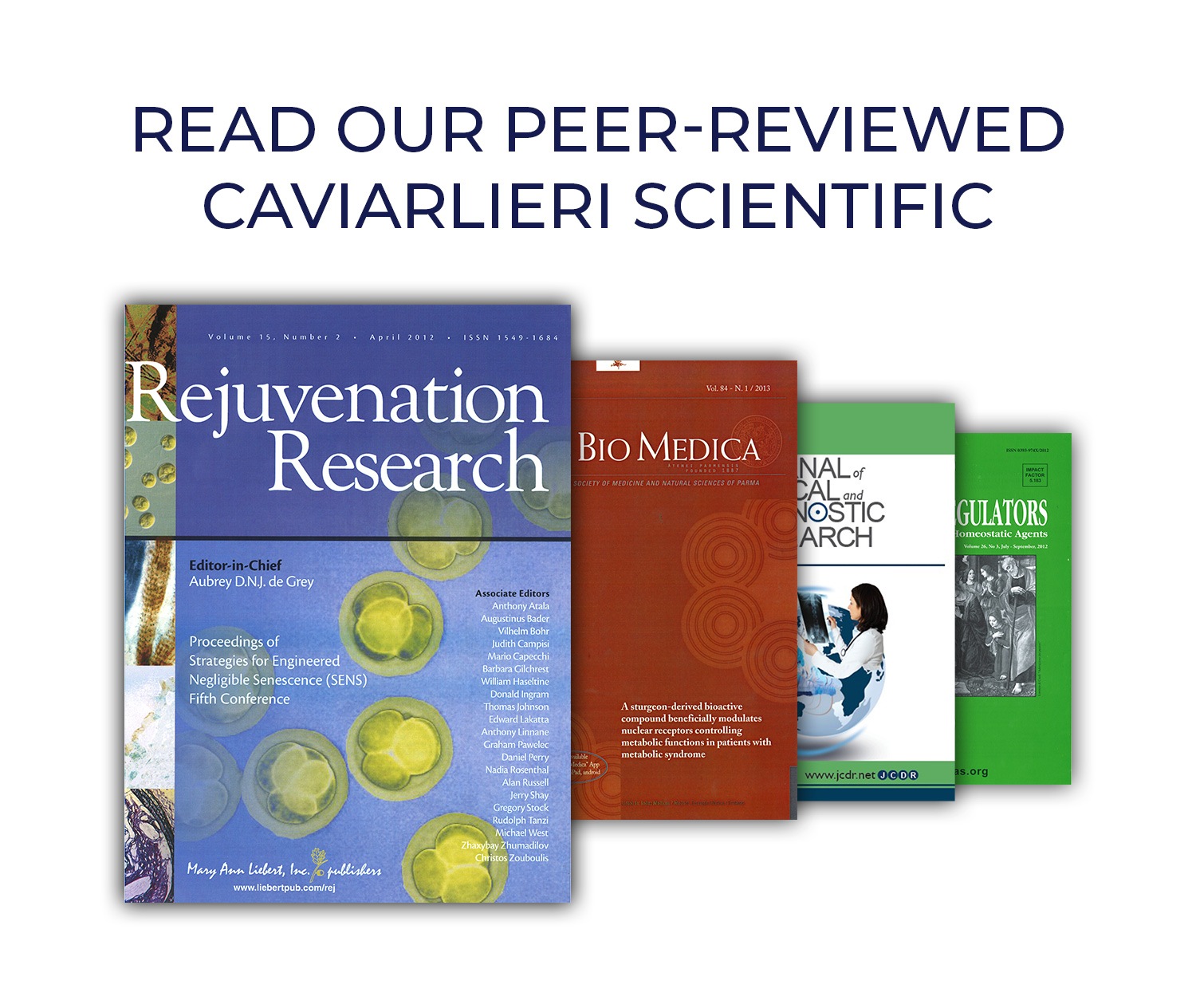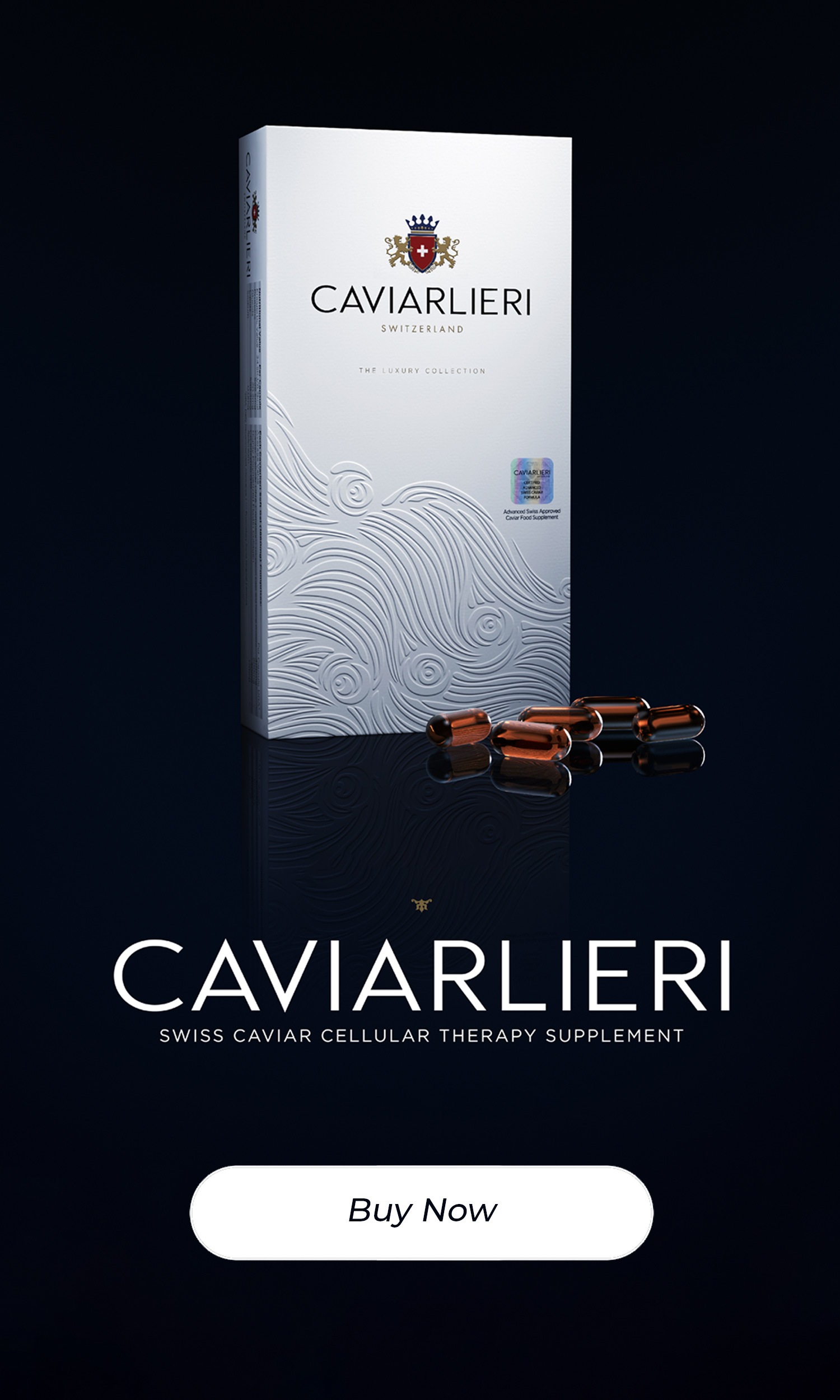Recovery From Coronavirus & Lingering Side Effects
Caviarlieri | Published October 12, 2020
Since the onset of the COVID-19 (coronavirus) pandemic last year, there have been several anecdotal reports of survivors who are still suffering from the persistent, long-term side effects from the infection which are alarming. Now with more than 23 million coronavirus infections worldwide and millions of people who have been fortunate to recover from COVID-19, the statistical patterns about the virus’s lingering malefic effects are starting to emerge. An authoritative report in the British Medical Journal on August 11th concluded that so far as many as 60,000 people in Britain who have recovered have long-term symptoms. Yet only about 6% of Britain’s population, around 4m people seems to have been infected with the virus so far.
The side effects which are disconcerting are reported as follows:
Chronic Shortness of Breath

We know that the hallmark of many COVID-19 cases is damage to the lungs. Aggressive inflammation leads to the destruction of lung tissue and the formation of scars. The scarring, in turn, impedes the flow of oxygen from the lungs into the blood. That can cause breathlessness, even with light exercise. Small studies of COVID-19 (coronavirus) patients discharged from hospitals have found that 25-30% have impaired oxygen flow.
The most severely ill patients with COVID-19 often suffer from pneumonia and acute respiratory distress syndrome, or ARDS, while ill. Doctors have not followed patients who have recovered from the new coronavirus long enough to know if there will be long-term problems with breathing.
However, a study of health care workers in China who contracted SARS, caused by the SARS-CoV coronavirus during the 2003 outbreak, are reassuring. Lung damage (measured by interstitial changes seen on CT scans of the lung and pulmonary function test results) mostly healed within two years after the illness.
Sense of Taste and Smell
Since the start of the COVID-19 (coronavirus) pandemic, it has become clear that many people with the infection lose their sense of smell and taste. And doctors are concerned that some will never get back to normal.
At this moment in time, it’s hard to know how common the symptom is. First, there were anecdotal reports of COVID-19 patients who had lost their ability to smell or taste. One study of patients hospitalized for COVID-19 that used objective tests to detect smell “dysfunction showed that 98% of the patients had reported loss of smell.”
But the problem isn’t limited to severely ill patients. It appears to be common, and even a “cardinal” symptom, among people with milder COVID-19 infections. Cardinal symptoms are the key ones from which a diagnosis is made.
For example, in another study of European patients with mild-to-moderate COVID-19, 86% reported problems with their sense of smell, while a similar percentage had changes in taste perception.
Fortunately, the issue resolves for most people after a period of time. For some patients, improvement has been slow and doctors are expecting that not all of these patients are going to return to their pre-COVID level of function. For others, they are left with permanent olfactory dysfunction.
Post-Infection Fatigue Syndrome

Recent analysis by the COVID-19 Symptom Study suggested that as many as one in 10 people with COVID-19 (coronavirus) have been sick for more than three weeks after symptoms first emerge. Some of the most pernicious problems faced by the group of long-haulers are chronic fatigue, high temperature, insomnia, headaches, brain fog, tingling sensations and dizziness.
John Geddes, professor of epidemiology at the University of Oxford, believes that protracted illness is likely to be caused by the virus getting into the nerve cells of the brain. Others suggest that an elevated immune response to the virus may be damaging the cells in key parts of the body. Another possibility is that even after the infection has cleared, the prolonged and inappropriate immune response persisted.
In a previous study involving a chemical called interferon-alpha, which was given to people as a treatment for hepatitis C, it generated a flu-like illness in many patients and post-viral fatigue in a few. Researchers have studied this “artificial infection response” as a model of chronic fatigue. They found that baseline levels of two molecules in the body that promote inflammation – interleukin-6 and interleukin-10 – predicted people’s subsequent development of chronic fatigue. This means that inflammation which was triggered during the infection has become somewhat chronic, potentially causing persistent fatigue.
Blood Clots
Blood clots may arise in up to a fourth of critically ill COVID-19 patients. Blood clots can cause serious long-term complications if the clots break loose from blood vessels and migrate to the lung and cause a pulmonary embolism or go to the brain and cause a stroke.
To prevent blot clots, physicians are now instituting blood thinners prophylactically when there is a rise in the concentration of the D-dimer, which is a fragment of fibrin – a protein that makes blood clot.
Heart Problems
In one study, inflammation of the heart muscle, called myocarditis or cardiomyopathy, was observed in a third of severely ill COVID-19 patients. Arrhythmias – an irregular heartbeat – are also seen. It is not known if this is due to direct infection of the heart or secondary to the stress caused by the inflammatory response to this infection.

A recent study from the University of Frankfurt in Germany showed abnormal heart findings in more than 75% of people who had recently recovered from COVID-19. A considerable majority of patients in the study were found to have had inflammation in the heart and muscle lining.
This can be troubling as inflammation in the heart can lead to long-lasting cardiac disease and failure.
According to doctors, there’s a lot more that needs to be studied, but it’s important to know that there’s the possibility out there that a COVID-19 infection could mean development of a serious heart condition.
Brain and Neurological Issues
Research shows COVID-19 can affect the brain and central nervous system. Some people have reported symptoms like headaches, dizziness, trouble concentrating or recalling things and even hallucinations after recovering from COVID-19. Investigators indicate that symptoms are most common in patients who had severe forms of disease. The risk of getting a stroke is also an ongoing concern among patients who have recovered from COVID-19.
Diabetes
Diabetics are at increased risk of severe COVID-19, which may in part be attributable to an overreaction from the immune response to the infection.
But the COVID-19 and diabetes interaction may go in the other direction as well. Elevations in glucose are seen in severe cases of COVID-19 in some patients who do not have a prior history of diabetes. Because the virus interacts with the angiotensin-converting enzyme 2, or ACE2, on human cells, it is plausible that changes in ACE2 activity could be one of the causes of diabetes in patients with the new coronavirus. In any case, it will be important in the long-term to follow up.
Secondary Infection
A secondary infection means that you get an infection unrelated to the first problem you had. In this case, it means someone with COVID-19 gets infected with something else.
A review of several studies done so far on hospitalized COVID-19 patients found that secondary infection is a possible — but not common — complication. Sometimes, a person fighting off, or recovering from, a virus gets infected by bacteria. This can be serious enough to raise the risk of death.
Confronted with a baffling array of symptoms and few detailed explanations about exactly what is going wrong, doctors have no other choice but to fall back on the experience and lessons from treating other illnesses. Lingering symptoms are not the exclusive preserve of COVID-19. Full recovery from other viral diseases such as influenza can also occasionally take months. Studies in America, Britain, China and Europe are already underway to evaluate the persisting symptoms of post COVID-19. But for now, those suffering from the lingering effects of the disease must deal not only with the physical symptoms, but with uncertainty as to when they can recover.
How can Caviarlieri, a Swiss Caviar Cellular Therapy supplement potentially help to mitigate post COVID-19 symptoms?
It does by reducing and controlling inflammation and enhancing your immune functions.
Caviarlieri is scientifically and synergistically developed to stimulate and trigger our own body ‘s system to heal, repair and renew our cells versus damaged cells. By providing bio active nutrition at the cellular level, Caviarlieri helps accelerate protein synthesis and cellular repair.
Significant Reduction of Inflammation
Caviarlieri is scientifically proven to help reduce the Tumour Necrosis Factor Alpha which is an important inflammatory biomarker for metabolic syndrome conditions. In addition, Caviarlieri can also reduce the C-reactive protein (CRP), a blood test marker for inflammation in the body. CRP is classified as an acute phase reactant, which means that its levels will rise in response to inflammation.
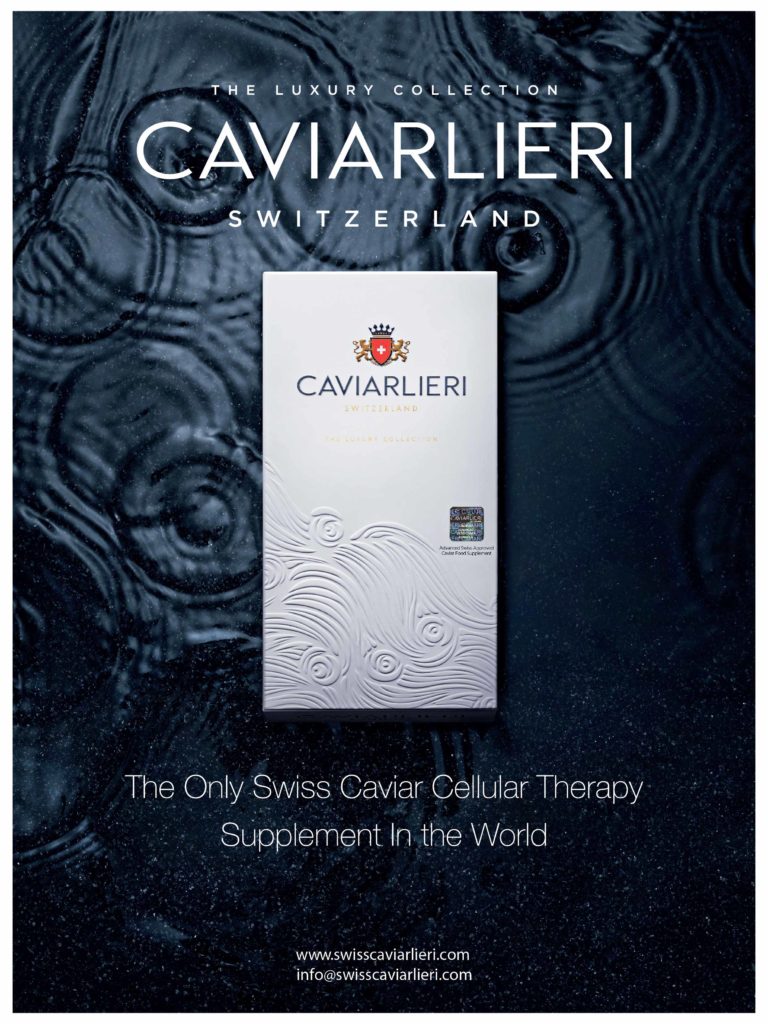
There are also several current and ongoing studies which indicate that Caviarlieri triggers the epigenetic mechanisms of the cells to activate gene expression for inflammation reduction which will help alleviate the onset of any of the risks associated with the diseases as a consequence of metabolic syndrome.
Note: Metabolic syndrome is a cluster of conditions such as high blood pressure, high blood sugar, unhealthy cholesterol levels, excess abdominal fat that increases your risk of heart disease, stroke and type 2 diabetes.
- Published in Peer Reviewed Journal – Acta Bio Medical / Official Journal of the Society of Medicine and Natural Sciences of Parma Vol 84-53-60/2013
A sturgeon-derived bioactive compound beneficially modulates nuclear receptors controlling metabolic functions in patients with metabolic syndrome
A. Lorenzetti, R. Catanzaro, G. Bertuccelli, N. Zerbinati, . Jain, U. Solimene, S.K. Yaduvanshi, N. Srivastava, E.Minelli, H. Yadav, C. Tomella, F.Marotta
The aim of the study was to test the possible effects of a novel sturgeon-derived compound Caviar DNA Extract (LD-1227) on inflammatory markers related to metabolic nuclear receptors in patients with metabolic syndrome. The study population consisted of 76 patients with metabolic syndrome and 30 healthy subjects who were maintained to their current treatments and randomly supplemented with A) Caviar DNA Extract (LD-1227) (n=38) or B) placebo (n=38) as compared to C) healthy controls (n=30). Caviar DNA Extract (LD-1227) or placebo (water-soluble starch) were given daily at breakfast and dinner for three months.
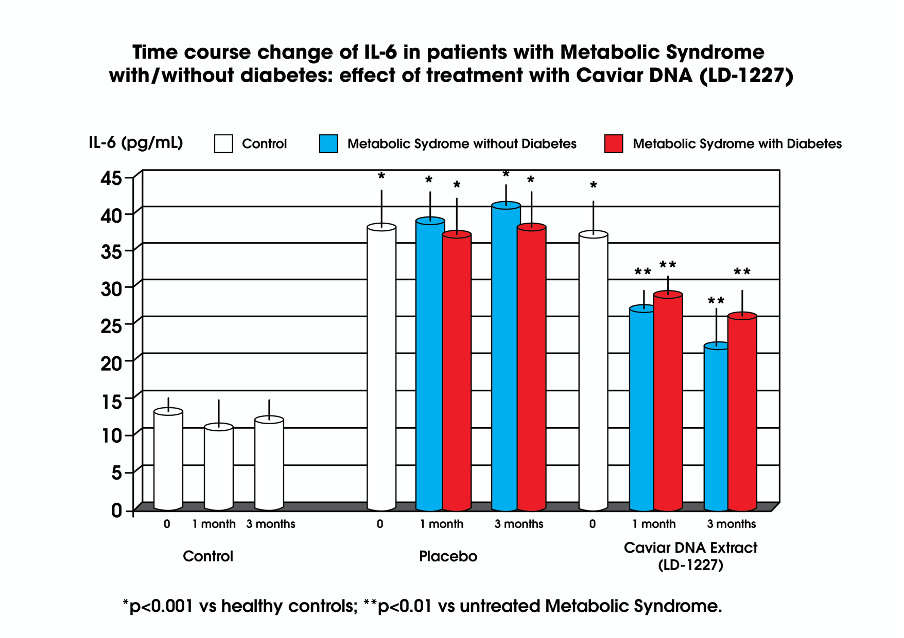
At the end of the study period, as compared to B group, Caviar DNA Extract LD-1227-treated patients showed a significant improvement of all parameters (hs-CRP, IL-6, TNF-alpha) tested, irrespective of the presence of diabetes. Although the metabolic syndrome remains a multifaceted condition requiring a complex approach, Caviarlieri (LD-1227) could be a potential safe therapeutic tool to be integrated into a wider treatment and preventive medicine schedule strategy.
Sustainable Immunity
Caviarlieri is formulated with potent bioactive ingredients like Sturgeon Caviar DNA cellular extract and high quality marine peptides which are extremely rich in DHA and EPA (essential fatty acids) known to enhance B cell activity, which could be useful for those with a compromised immune system.
Read More on: How to Develop a Strong and Sustainable Immune System Over Time
Manufactured using a proprietary Swiss cold extraction technology, Cellularix, the ingredients are kept “active” so that the chemical integrity and potency of the micro nutrients are not destroyed or compromised. This will help optimize our absorption of the micro nutrients and maximize the outcomes and results.
In addition, the Caviarlieri is made of peptides which help to escort the nutrients into our cells for protein synthesis which is an important process to accelerate cellular renewal and repair versus damaged cells. If essential nutrition is provided at the cellular level, it will definitely help to maintain or strengthen the functionality of our immune system.
Caviarlieri Switzerland – Scientific Studies
Published in Peer Reviewed Journals
The scientific studies on Caviarlieri published in peer reviewed journals have proven that it has powerful antioxidant properties which can potentially prevent damage to immune cells by neutralizing free radicals. Free radicals are substances in the environment that can damage cells and reduce immunity. Supplementing with Caviarlieri can also help increase the activation of cells involved in regulating our immunity.
Another active ingredient of Caviarlieri is Selenium. This potent antioxidant keeps our immunity in check by identifying and warding off potentially harmful threats, like viruses, parasites and bacteria. It is also known to help regulate our immune responses and protect us against infectious microorganisms.
Protects Brain from Oxidative Stress
One of the key ingredients of Caviarlieri is the Caviar Cellular DNA extract with Marine peptides which can help in the rejuvenation and revitalization of cells. These bio marine compounds have also been found to have a positive effect on basic mechanisms that affect key inflammatory molecules involved in metabolic syndrome.
In addition ,these extracts have strong antioxidant properties which can potentially help to reduce oxidative stress in the brain. Oxidative stress occurs upon excessive free radical production resulting from an insufficiency of the counteracting antioxidant response system. The brain, with its high oxygen consumption and lipid-rich content, is highly susceptible to oxidative stress.
Lowers Glycemic Index – Diabetes Management
It is proven through clinical studies that the Marine Collagen Peptides in Caviarlieri lowers glycemic index by 37% (which means the glucose impact is reduced significantly). Results of a preliminary clinical trial also showed that food with marine collagen peptide supplementation will lead to increase in plasma PYY level and decrease in plasma ghrelin level. These 2 hormones act synergistically to reduce the appetite on one hand, and to increase the feeling of satiation on the other.
About Caviarlieri
Caviarlieri is a food supplement approved by the Swiss Public Health Authority and it is available in the leading Swiss Medical Centres and Spas as well as pharmacies throughout Switzerland. It is a potent supplement manufactured by Swiss Caps Inc. in Switzerland, which is recognized and verified by Current Good Manufacturing Practices (CGMP) and is a US FDA Approved manufacturing facility. In addition, Swiss Caps Inc. is BRC compliant. BRC is an international Food Safety Management Systems standard, and is one of the GFSI recognized certification schemes.

Caviarlieri is also a listed supplement on the Cologne List® and therefore undergoes independent quality checks. These are carried out by one of the globally-leading laboratories in nutritional supplement analytics for doping substances.

